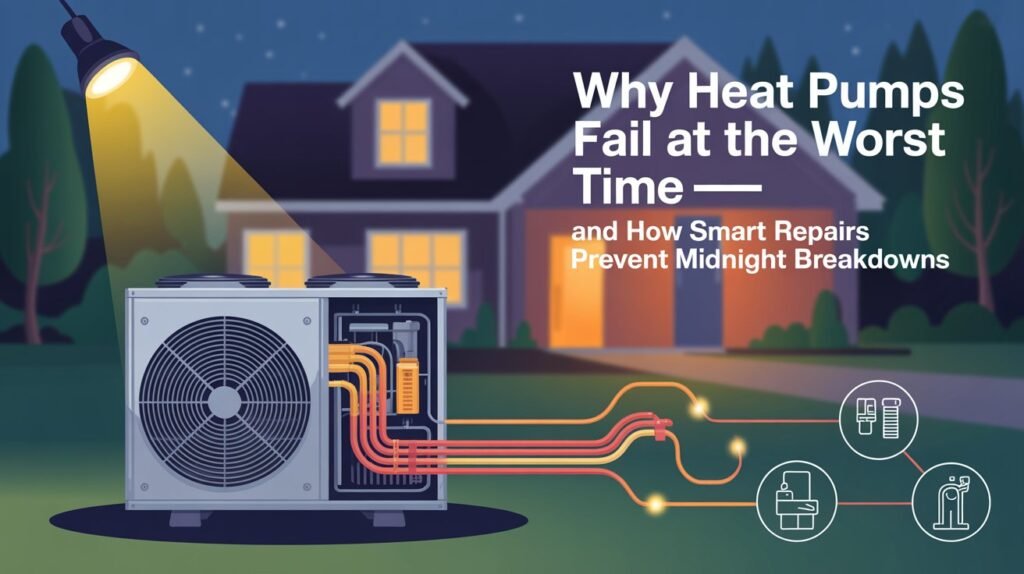It always seems to happen when you need comfort the most. A freezing winter night, or the first blistering summer day, and suddenly your heat pump gives up. Instead of steady warmth or cool relief, you’re left with odd noises, weak airflow, or no response at all. These breakdowns may feel sudden, but in most cases, the warning signs were already there. When ignored, small issues snowball into late-night emergencies. The solution lies in smart repairs and consistent maintenance—steps that keep your system working before things spiral out of control. Let’s break down why heat pumps fail, the repair strategies that solve these issues, and the long-term benefits of professional care.
The Hidden Struggles of a Failing Heat Pump
Why Energy Bills Spike Without Warning
When a heat pump struggles, efficiency is usually the first casualty. Dirty coils, clogged filters, or low refrigerant levels make the system work harder. That extra strain drives up monthly energy bills—long before the unit completely fails.
Noises That Signal Bigger Trouble Ahead
Heat pumps are designed for quiet operation. So if you start hearing grinding, buzzing, or banging, it’s rarely harmless. These sounds often point to loose parts, worn bearings, or failing motors. Ignoring them means a higher chance of breakdowns at the worst possible time.
When Ice and Leaks Bring Your System to a Halt
Frozen coils and refrigerant leaks are two of the most common causes of sudden failure. Ice buildup blocks airflow, while leaks reduce the system’s ability to transfer heat. Left unchecked, both problems can shut your heat pump down entirely.
Repair Tactics That Keep Your System Alive
Pinpointing Electrical and Mechanical Faults
Modern heat pumps combine electrical circuits with mechanical components. Professional technicians use diagnostic tools to test wiring, measure voltage, and check sensors. By finding the exact source of the issue, they stop small problems from turning into major failures.
Restoring Lost Efficiency Through Smart Fixes
Cleaning coils, sealing duct leaks, and replacing worn parts all bring a heat pump back to peak performance. Restoring efficiency doesn’t just improve comfort—it lowers energy bills and reduces stress on the system.
Stopping Small Issues Before They Explode
Most midnight breakdowns don’t happen out of nowhere. A weak capacitor, a dirty filter, or a failing fan motor usually gives signs first. Smart repairs catch these issues early, preventing emergency calls when you least expect them.
Safeguarding Comfort and Your Investment
Seasonal Checkups That Prevent Emergencies
Routine inspections before summer and winter are like insurance for your comfort. A seasonal tune-up includes cleaning, lubrication, refrigerant checks, and safety tests. These small steps dramatically cut the risk of surprise failures.
Swapping Out Weak Parts Before They Fail
Parts like relays, belts, and blower motors wear down over time. Replacing them before they break keeps your system running smoothly. It’s cheaper to fix a weak component early than to repair a full system collapse later.
Adding Years to Your System’s Life With Care
On average, a well-maintained heat pump lasts 12–15 years. Without care, that number drops quickly. Regular service not only protects your investment but also ensures your home stays comfortable year after year.
Why Calling a Pro Beats DIY Every Time
The Dangers of Mishandling Refrigerant
Refrigerants are essential for cooling and heating, but they’re also toxic and tightly regulated. Attempting to recharge or handle leaks without certification is dangerous—and often illegal. Professional repair ensures safety and compliance.
High-Voltage Risks That Hide Behind Repairs
Heat pumps rely on high-voltage components to power compressors and fans. DIY attempts to fix wiring or replace capacitors can result in shocks or fire hazards. A certified technician knows how to handle these risks properly.
How Professional Fixes Save Money in the Long Run
Quick DIY fixes may seem cheaper, but they often mask deeper issues. That means more breakdowns, more parts replaced, and higher costs over time. Professional repairs target the root problem, saving money and stress in the long run.
The Lasting Rewards of Timely Heat Pump Repairs
Lower Bills Without Sacrificing Comfort
An efficient, well-maintained heat pump doesn’t waste energy. That means lower utility bills, more consistent temperatures, and fewer surprises when the monthly statement arrives.
Fewer Emergencies and Late-Night Surprises
No homeowner wants to deal with a system failure at midnight in January. Regular service and timely repairs minimize emergency calls, keeping your family comfortable without the late-night stress.
Peace of Mind Knowing Your Home Stays Comfortable
Perhaps the greatest benefit of smart repairs is peace of mind. Families know their system is reliable, safe, and ready for whatever the season brings. That sense of security is worth far more than the cost of a repair visit.
Conclusion
So, why do heat pumps always seem to fail at the worst possible time? It’s usually because small problems were left untreated until the system couldn’t handle the demand. Frozen coils, leaks, and worn-out parts add up until the heat pump gives out—often during extreme weather. The fix is simple: smart repairs and regular maintenance. Professional service not only prevents emergencies but also extends system life, lowers bills, and restores confidence in your home’s comfort. Instead of waiting for a midnight breakdown, take action early. With the right care, your heat pump doesn’t just survive the seasons—it thrives, keeping your home warm in winter, cool in summer, and comfortable all year long.
Want more to read? Visit dDooks.


